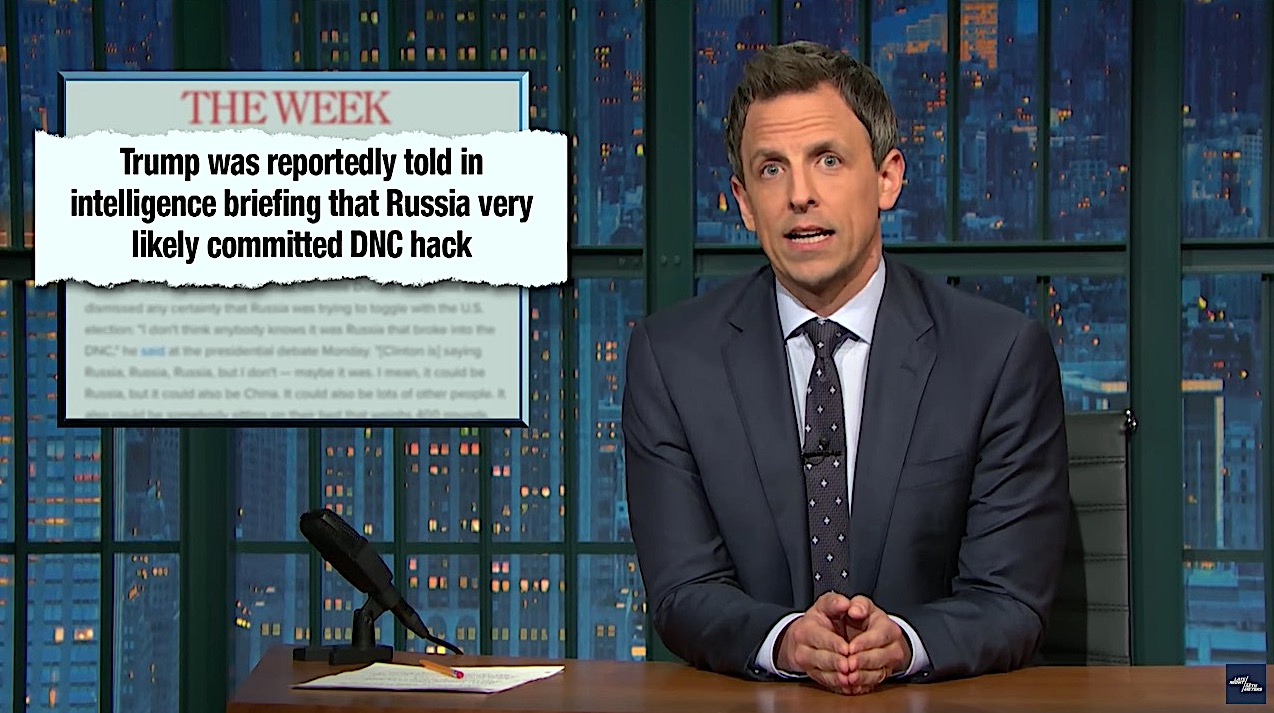Seth Meyers makes some good points about Donald Trump and Russian election meddling


A free daily email with the biggest news stories of the day – and the best features from TheWeek.com
You are now subscribed
Your newsletter sign-up was successful
Over the weekend, President-elect Donald Trump's casual "dissing" of the Army-Navy football game was overshadowed by reports that the CIA has firmly concluded that Russia interfered with the presidential election to help Trump reach the White House, Seth Meyers noted on Monday's Late Night. Russian agents reportedly hacked emails of both parties, but were suspiciously selective in which ones they leaked.
"So they only released the Democrats' emails, not the Republicans' — although to be fair, what could possibly be in the Republican emails that was more embarrassing than what their candidate was saying out loud in public?" Meyers asked. "Donald Trump is a hacked email come to life. 'Did you hear? Donald Trump made fun of the disabled.' 'In a private email?' 'No, into a microphone in an arena.'" Meyers noted that the RNC said it wasn't hacked and ridiculed Trump's assertion that he won a landslide in the Electoral College, then reviewed Trump's previous public doubts about the intelligence community's belief that Russia hacked the election — and Trump's alternate explanations. "A 400-pound guy at his home in New Jersey? Is he actively trying to frame Chris Christie?"
It can be healthy to take anonymous claims from intelligence officials with a huge grain of salt, so "we need a full investigation and the results to be made public," Meyers said, but Trump could also allay suspicions by repudiating Russia's involvement or at least not publicly questioning U.S. intelligence agencies. Instead, he is suggesting Russia is blame-free, filling his Cabinet with people with close Kremlin ties, and skipping intelligence briefings, explaining Sunday on Fox News that he's "like, a smart person" so doesn't need regular briefings. "Here's the thing about smart people: They don't go around telling people they're smart," he said, citing Stephen Hawking as proof.
The Week
Escape your echo chamber. Get the facts behind the news, plus analysis from multiple perspectives.

Sign up for The Week's Free Newsletters
From our morning news briefing to a weekly Good News Newsletter, get the best of The Week delivered directly to your inbox.
From our morning news briefing to a weekly Good News Newsletter, get the best of The Week delivered directly to your inbox.
"We're about to enter a potentially dangerous period," Meyers said, laughing for some reason: "A president with a weird affinity for authoritarians and dictators appointing plutocrats to his Cabinet and fighting with America's own intelligence agencies. I don't see how Trump could get away with all this — unless he finds a way to distract us all for the next four years." So.... Watch below. Peter Weber
A free daily email with the biggest news stories of the day – and the best features from TheWeek.com
Peter has worked as a news and culture writer and editor at The Week since the site's launch in 2008. He covers politics, world affairs, religion and cultural currents. His journalism career began as a copy editor at a financial newswire and has included editorial positions at The New York Times Magazine, Facts on File, and Oregon State University.
-
 ‘Zero trimester’ influencers believe a healthy pregnancy is a choice
‘Zero trimester’ influencers believe a healthy pregnancy is a choiceThe Explainer Is prepping during the preconception period the answer for hopeful couples?
-
 AI surgical tools might be injuring patients
AI surgical tools might be injuring patientsUnder the Radar More than 1,300 AI-assisted medical devices have FDA approval
-
 9 products to jazz up your letters and cards
9 products to jazz up your letters and cardsThe Week Recommends Get the write stuff
-
 ‘One Battle After Another’ wins Critics Choice honors
‘One Battle After Another’ wins Critics Choice honorsSpeed Read Paul Thomas Anderson’s latest film, which stars Leonardo DiCaprio, won best picture at the 31st Critics Choice Awards
-
 A peek inside Europe’s luxury new sleeper bus
A peek inside Europe’s luxury new sleeper busThe Week Recommends Overnight service with stops across Switzerland and the Netherlands promises a comfortable no-fly adventure
-
 Son arrested over killing of Rob and Michele Reiner
Son arrested over killing of Rob and Michele ReinerSpeed Read Nick, the 32-year-old son of Hollywood director Rob Reiner, has been booked for the murder of his parents
-
 Rob Reiner, wife dead in ‘apparent homicide’
Rob Reiner, wife dead in ‘apparent homicide’speed read The Reiners, found in their Los Angeles home, ‘had injuries consistent with being stabbed’
-
 Hungary’s Krasznahorkai wins Nobel for literature
Hungary’s Krasznahorkai wins Nobel for literatureSpeed Read László Krasznahorkai is the author of acclaimed novels like ‘The Melancholy of Resistance’ and ‘Satantango’
-
 Primatologist Jane Goodall dies at 91
Primatologist Jane Goodall dies at 91Speed Read She rose to fame following her groundbreaking field research with chimpanzees
-
 Florida erases rainbow crosswalk at Pulse nightclub
Florida erases rainbow crosswalk at Pulse nightclubSpeed Read The colorful crosswalk was outside the former LGBTQ nightclub where 49 people were killed in a 2016 shooting
-
 Trump says Smithsonian too focused on slavery's ills
Trump says Smithsonian too focused on slavery's illsSpeed Read The president would prefer the museum to highlight 'success,' 'brightness' and 'the future'
